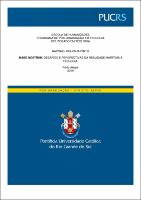| Compartilhe o registro |


|
Use este identificador para citar ou linkar para este item:
https://tede2.pucrs.br/tede2/handle/tede/9048| Tipo do documento: | Tese |
| Título: | Mare nostrum : desafios e perspectivas da realidade marítima à teologia |
| Autor: | Pinto, Raphael Colvara  |
| Primeiro orientador: | Oliveira, Nythamar de |
| Resumo: | O lugar operado pela realidade marítima, longe de ser libertador ou alienante, apresenta um caráter ambivalente que precisa ser analisado, pois não é apenas vetor abstrato de fluxo, como descreve o antropólogo Marc Augé, com o conceito de “não lugar”, mas, sim, um espaço onde as tensões entre a globalização economicista e a singularidade são desafiadas. Considerado historicamente como ambiente de interação entre os interesses políticos, militares e econômicos, os mares e oceanos tornaram-se lugares intensos de conexão e mobilidade, articulando escalas entre os diferentes níveis e experiências. Este entendimento tem sobrevivido aos diferentes cenários históricos do pensamento colonial que, durante o período de expansão marítima do século XV, globalizou a cultura europeia em detrimento de outras tidas como “primitivas”. Essa situação, denominada Modernidade, tem uma face oculta: a colonialidade como projeto civilizador. A partir disto, nos propomos uma revisão bibliográfica, apresentando como abordagem evidências dos padrões de “poder colonial” a partir da expansão marítima e da globalização contemporânea. A questão de pesquisa é: O legado do pensamento colonial é intrínseco à modernidade ou é um de seus desdobramentos? Qual o lugar da experiência marítima, quando se deseja propor um pensamento teológico não hegemônico, onde a própria religião sacralizou a violência e o imperialismo? A partir deste contexto, buscamos apresentar um arcabouço teórico-crítico do papel que o conhecimento epistemológico da Modernidade desempenhou na perpetuação da hegemonia europeia, delineando os princípios básicos a partir de uma interface entre a Teologia e as Ciências Sociais, enfocando o mar como lugar teologal. A hipótese foi que os mares e oceanos, não são apenas vetores da hegemonia colonial e espaço de circulação e de mercadorias, mas uma maneira distinta de estar no mundo, especialmente àqueles que vivem e trabalham nessa realidade. O seu caráter transitório carrega uma presença, considerando as pessoas que vivem no mar, e - ao mesmo tempo - também ausência e anonimato, entendendo como invisibilidade. A proposta final é construir pontes, percebendo que os mares têm o potencial tanto de integrar como de excluir. Aqui denominaremos de “maritimidade”, isto é, o lugar alternativo, assim como o ambiente onde Jesus lançou as redes para seu projeto messiânico. |
| Abstract: | The concept of “place” as defined by maritime reality, far from being either liberating or alienating, has an ambivalent character that needs to be described; it is not only an abstract flow vector, described by the anthropologist Marc Augé as the concept of “non place”, but it is also a place where the tensions between economic globalization and uniqueness of a culture are challenged. Historically considered as an environment of interaction between political, military and economic interests, the seas and oceans have become intense places of connection and mobility. This concept has survived the different historical scenarios of colonial thought which, during the maritime expansion period of the fifteenth century, globalized European culture to the detriment of others regarded as ‘primitive’. This situation, called Modernity, has a hidden face: colonialization as a civilizing project; from this, we propose a bibliographic review, presenting as an approach, evidence of the patterns of “colonial power” from the time of maritime expansion to contemporary globalization. The research question is: Is the legacy of colonial thought intrinsic to modernity or one of its consequences? What is the place of the maritime reality when one wants to propose a non-dominance of theological thought, where religion itself has sacralized violence and imperialism? From this context we seek to present a theoretical-critical framework of the role that epistemological knowledge of modernity played a role in the perpetuation of European dominance, outlining the basic principles from an interface between Theology and the Social Sciences; we will focus on the sea as a theological “place”, the hypothesis being that the seas and oceans are not only vectors of colonial hegemony and a space for transport of commodities, but also a distinct way of being in the world, especially for those who live and work in this reality. Its transitory character carries a presence in regard to the people living at sea and –at the same time – also absence and anonymity, understood as invisibility. The final proposal is to build bridges, realizing that the seas have the potential to both integrate and exclude. Here we will call it “maritimity”, that is, the alternate “place”, as well as the environment where Jesus cast the nets for his Messianic project. |
| Palavras-chave: | Colonialidade Não lugar Mar Realidade marítima Pensamento fraco Coloniality Non place Sea Maritime reality Weak thought |
| Área(s) do CNPq: | CIENCIAS HUMANAS::TEOLOGIA |
| Idioma: | por |
| País: | Brasil |
| Instituição: | Pontifícia Universidade Católica do Rio Grande do Sul |
| Sigla da instituição: | PUCRS |
| Departamento: | Escola de Humanidades |
| Programa: | Programa de Pós-Graduação em Teologia |
| Tipo de acesso: | Acesso Aberto |
| Restrição de acesso: | Trabalho não apresenta restrição para publicação |
| URI: | http://tede2.pucrs.br/tede2/handle/tede/9048 |
| Data de defesa: | 14-Nov-2019 |
| Aparece nas coleções: | Programa de Pós-Graduação em Teologia |
Arquivos associados a este item:
| Arquivo | Descrição | Tamanho | Formato | |
|---|---|---|---|---|
| Mare nostrum desafios e perspectivas da realidade marítima à Teologia.pdf | RAPHAEL_COLVARA_PINTO_TES | 3,52 MB | Adobe PDF |  Baixar/Abrir Pré-Visualizar |
Os itens no repositório estão protegidos por copyright, com todos os direitos reservados, salvo quando é indicado o contrário.




